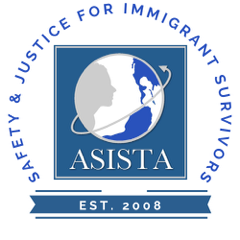Policy Update: DHS Publishes Harmful New U Visa Law Enforcement Resource Guide
It is beyond overwhelming to track the myriad ways, large and small, in which DHS’ policy is eroding access to critical immigration protections, including those designed to protect immigrant crime survivors. Sometimes these policy changes don’t grab headlines, but they all contribute to DHS’ calculated and callous plan to weaken existing paths to immigration benefits. Given our mission and expertise, ASISTA is deeply concerned about these policy changes as they often diminish access to immigration protections for survivors of domestic violence, sexual assault and human trafficking.
One recent example of these changes is the publication of DHS’ updated U visa Law Enforcement Resource Guide (Updated Guide) released last week. The Updated Guide provides guidance to law enforcement agencies (LEAs) regarding the U visa requirements and the law enforcement certification process.[i] In the past, the resource guide had been a useful tool for advocates to engage LEAs about the U visa program so that they could learn more about its requirements and procedures. However, the new Updated Guide reflects DHS’ blatant effort to encourage LEAs to limit their issuance of U visa certifications for eligible victims.
Several of DHS’ new recommendations to LEAs in the Updated Guide create unnecessary barriers for survivors to access U visa certifications, conflict with existing authority and contravene bipartisan Congressional intent in establishing this critical protection. Here are just a few examples of these barriers:
- Encouraging LEAs to conduct background checks on those seeking U visa certifications: Previous versions of the DHS Certification Guide indicate that USCIS’ would be the agency responsible for conducting background checks on U visa applicants; however, the updated guide repeatedly[ii] recommends LEAs conduct their own “discretionary background checks” on those seeking U visa certifications, and that they should share their findings with USCIS. At best, this suggestion is duplicative of USCIS’ own procedures, but at worst, it needlessly suggests that LEAs limit their issuance of U visa certifications.
- Encouraging time limits on certifications. DHS suggests that LEAs consider “whether the agency will establish specific parameters related to certifying cases where a significant amount of time has passed since commission of the crimes” when in fact the statute and the regulations establish no statute of limitations on signing U visa certifications.[iii] Often times, survivors may not know that U visa protections exist, or else may be impacted by the trauma following their victimization to learn more about the program. This suggestion is ultra vires to the U visa statute and regulations and counter to DHS purported dedication to “promoting a Victim-Centered Approach.”[iv]
- Encouraging Withdrawals. The Updated Guide also emphasizes that LEAs may withdraw or disavow certifications at any time if “they later discover information regarding the victim, crime, or certification that your agency believes USCIS should be aware of.”[v] This overbroad and vague recommendation is deeply irresponsible, and serves to undermine access to U visa relief.
Overall, the updated guide advances DHS’s efforts to eviscerate the U visa program and is part and parcel of DHS’ overall mission to reduce legal immigration to the United States. It is hard enough for immigrant survivors to come forward to seek assistance from law enforcement, given that abusers often threaten that reaching out for help will result in their deportation. Instead of undermining access to critical victim protections, DHS should focus on ways to actually promote a victim-centered approach
[i] U visas were created by a bipartisan majority in Congress in 2000 as part of the Trafficking Victims Protection Act (TVPA) with the dual purpose of strengthening public safety efforts by encouraging immigrant victims to come forward to report crimes to law enforcement, and to provide protection to those who come forward. Applicants applying for U visa relief must submit a certification from an agency or judge that demonstrates they were a victim of a crime and that they were, are or will be helpful in the investigation or prosecution of a qualifying criminal activity.
[ii] See e.g. U visa Law Enforcement Resource Guide at pages 2, 3, 4, 11,12, and 14.
[iii] Id. at 11.
[iv] Id at i.
[v] See e.g. U visa Law Enforcement Resource Guide at 3, 4, 9, 14.
